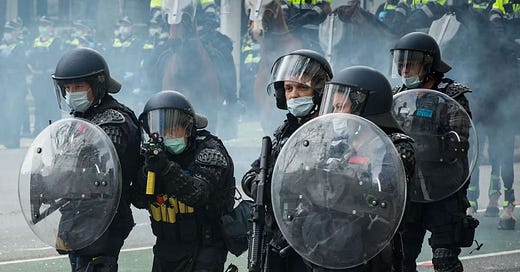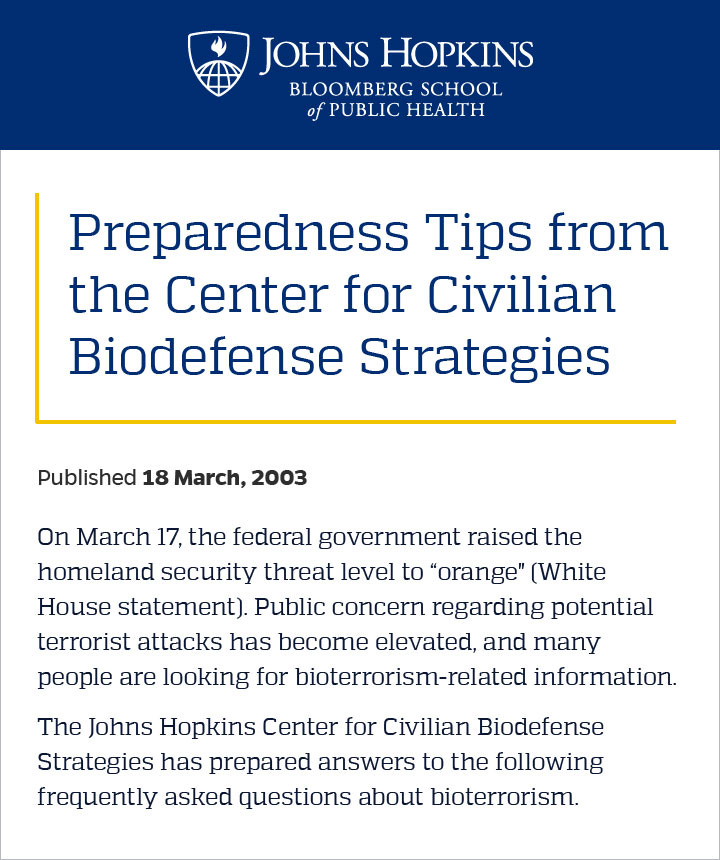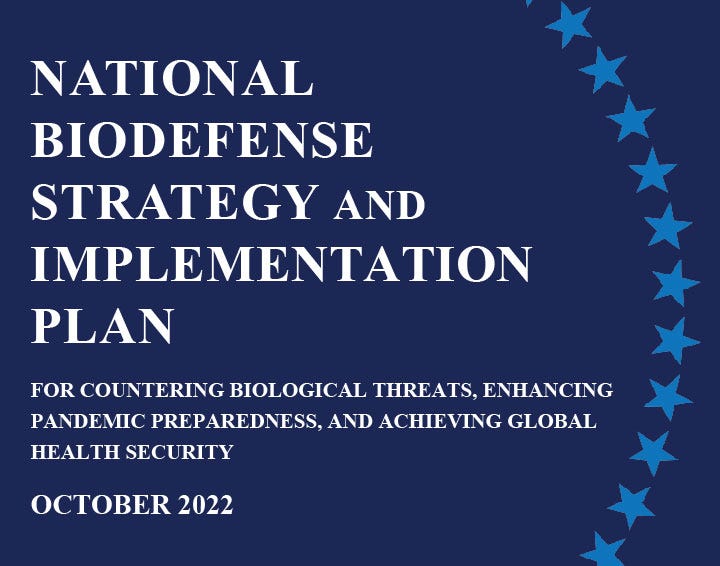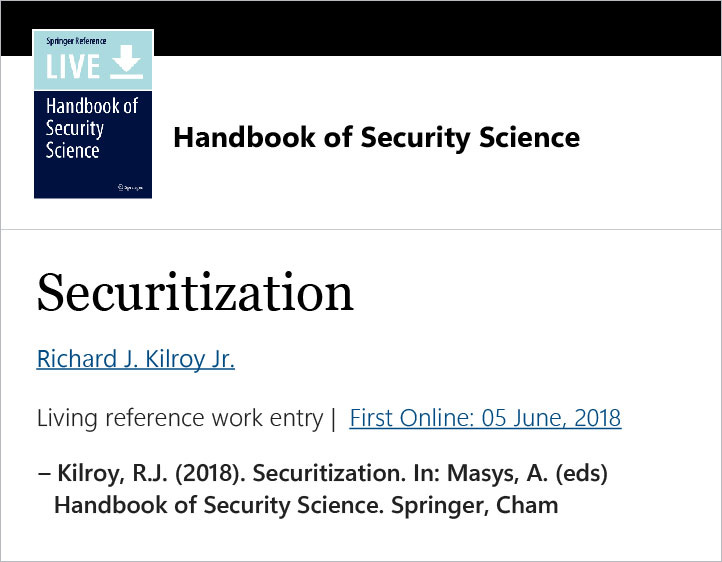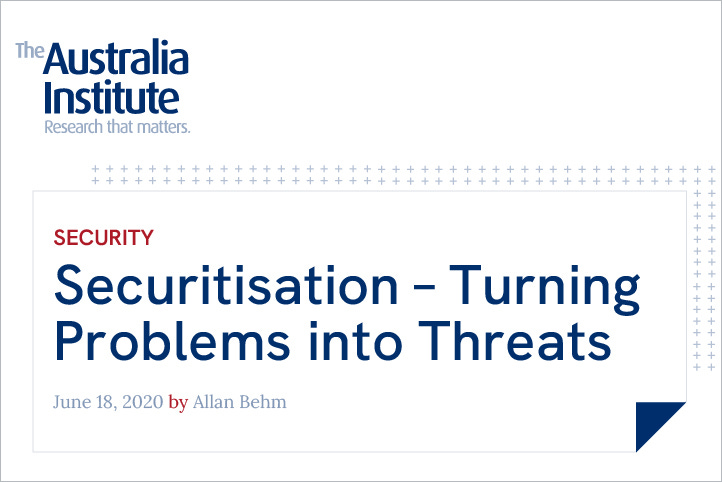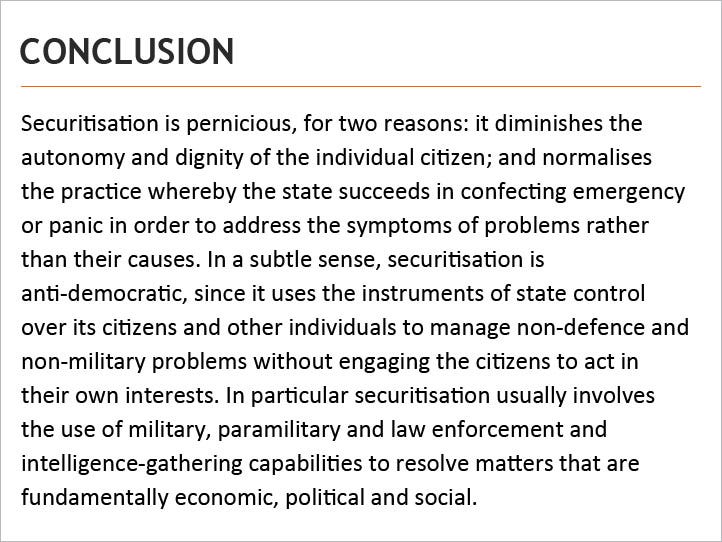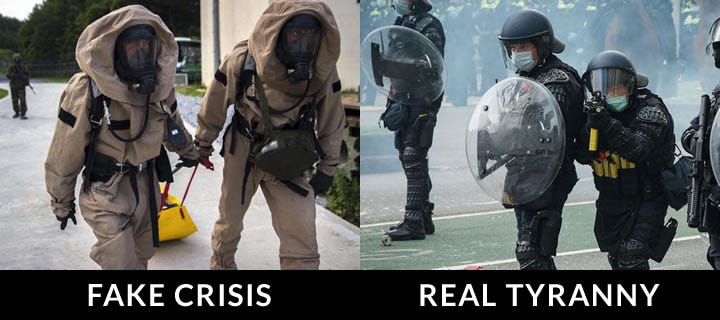Please read the section on “Securitization Theory” in this post, as the theory that underpins what we all intuitively “know” to be the case is key to understanding the origin and hallmarks of the authoritarian Covid Response - and the broader “New Normal” governance structure that is being implemented in once-free nations states and centralized globally.
So-called ‘Health Security’ - aka ‘biodefense’ - was the basis of the militarized transnational ‘Covid Response’.
Experts on the subject of securitization have long warned that contrived crises are a tool to deploy despotism and divert resources under the pretext of pursuing ‘security’.
The Undeclared War
A previous post on “Medical Countermeasures for National Security” included Mike Benz’s reference to “military rule” and “the inversion of democracy” (during his interview with Tucker Carlson) as highlighted by the merger of the national security state and the censorship industry.
Also covered was confirmation (via
) that the Pentagon notified contractors within the Medical CBRN Defense Consortium on 4 February 2020 of the “national security” Covid operation: This was a month before “military medical experts” from the U.S. DoD delivered a press briefing on the “whole of government” plan to develop countermeasures to defend against Covid-19 - described as “a low risk infection… even in the absence of a vaccine” - on 5 March 2020.This post will present a “101” overview of “Securitization Theory” and its translation into practice as seen with the draconian “Covid Response”.
Police in Melbourne, Australia confront construction workers protesting mandatory vaccination - 21 Sep 2021
Source: https://www.sbs.com.au/news
To set the scene, please take 30 seconds to watch this video clip link - related to the above photograph - from a journalist in Melbourne on 21 September 2021 (sound on):
https://twitter.com/paul_dowsley
Why were the anti-vaccine-mandate protests by “Australian Tradies” less visible than similar protests by “Canadian Truckers” a few months later? The reason - apart from the lack of big trucks - is because the Victoria State Government used its police powers to restrict media reporting of the demonstrations by closing the airspace over the city centre:

Source: https://www.theage.com.au/
Before the CliffsNotes cut-and-paste version of “Securitization” it’s worth reviewing the concept of “security” from the perspective of public policy with reference to so-called ‘Health Security’.
‘Health Security’: a heist in hazmat suits and an attack on human rights
In mainstream media and elsewhere we now regularly encounter news coverage about ‘Health Security’ and ‘Biosecurity’ as they relate to the mitigation of potential ‘outbreaks’ of infectious diseases. (Examples of other ‘securitized sectors’ are climate security, cyber security, election security and even human security.)
The umbrella term - ‘Global Health Security’ - is also increasingly used since the launch by the U.S. CDC in 2014 of the Global Health Security Agenda to accelerate the implementation of the International Health Regulations (IHR 2005) via the WHO.
Since 2018, The (UK) Telegraph has pushed “Global Health Security” with the “support” of Bill Gates… no strings attached!
Source: https://www.telegraph.co.uk/
Many of us first heard of ‘Health Security’ via the “John Hopkins Center for Health Security” - the (supposedly) independent U.S-based think tank that co-hosted the pandemic rehearsal “Event 201” in October 2019, and before that published the “SPARS Pandemic” futuristic scenario in October 2017.
JHCHS was formerly known as the “Johns Hopkins Center for Civilian Biodefense Strategies” - which may have stated the organization’s agenda too explicitly!
Johns Hopkins: “Preparedness Tips from the Center for Civilian Biodefense Strategies” - 2003
Source: https://publichealth.jhu.edu/
(Qu: “What can we do about bioterrorism?” Ans: “Demand the authorities protect us from it!”)
Consider the above webpage link from 2003. It could be summarized as:
Public Health + Homeland Security = Health Security
Fast-forward two decades to a brief video promotion for the “Johns Hopkins Center for Health Security” dated October 2023 - four years after Event 201. In the intervening years the Covid Response was unleashed. Watch and pay close attention to the messaging about ‘Health Security’, in particular the reference to…
“big problems” “risks” and “threats” — and “solutions” and “tools”
“trusted source” and “public guidance”
“leaders” and “decision-makers”
“partnerships” and “policy change”
And, of course, “preparedness” for inevitable “future pandemic events”
The Health Security Heist: “We’re all in (on) this together!”
Source: https://www.youtube.com/@centerforhealthsecurity
Note: The main funding sources for the Johns Hopkins Center for Health Security include the U.S government and “Open Philanthropy”: In the three years preceding the Covid Response, JHCHS received $35 million from “Open Philanthropy” (including $20 million in September 2019 just prior to Event 201) - and in late 2023 JHCHS was awarded a $23.5 million grant by the CDC for a new “epidemic preparedness project”.
This is the kind of major (U.S. Government) “policy change” where the Johns Hopkins Center for Health Security exerts influence:
The U.S. “National Biodefense Strategy and Implementation Plan for Countering Biological Threats, Enhancing Pandemic Preparedness, and Achieving Global Health Security” - Oct 2022
Source: https://aspr.hhs.gov/Pages/Home.aspx
Q: What’s a bigger threat to ‘Global Health Security’ than run-of-the-mill ‘pandemics’?
A: GCBRs or “Global Catastrophic Biological Risks” (re-invented by JHCHS in 2017).
We see GCBRs as a special category of biological threats that deserve careful study and action to counter them, because of the extraordinary consequences they would have for humanity and because they are potentially tractable. A broadly shared definition and understanding of these risks could help focus collective efforts, direct resources where needed, and communicate more clearly about what these challenges are and how to prevent and respond to them.
Fear not, as the Johns Hopkins Center and committed philanthropists are on the case!
Two senior executives from JHCHS en route to a meeting with philanthropists to discuss the existential threat of GCBRs: “Nature is not the biggest bioterrorist! Please give generously”
Source: https://www.linkedin.com/company/jhcenterforhealthsecurity - October 2023
(Periodic reminder that billionaire Bill Gates keeps warning that a high mortality global bioterrorism event is a matter of when - not if!)
On the subject of ‘Health Security’, Wikipedia is surprisingly up-front with this insight:
Critics of health security are concerned with the impact on civil liberties… The linkage of health and security has the potential to threaten human rights or lead to the prioritisation of some diseases over other health needs. […] Health security measures have been criticized for their potential to incite anti-democratic responses […] Securitization of health has increased concerns for human rights as public health is politicised and militarised.
Understanding the over-arching theory of “securitization” is important because the ecosystem of ‘Global Health Security’ and ‘biodefense’ and ‘pandemic preparedness’ - with a multitude of international “stakeholders” - has been operationally and ideologically bolstered by the Covid Response, creating a very real demand for "the next pandemic" and reinforcing the security state as the new system of globalized governance.
Securitization Theory: “Fake Crisis - Real Tyranny”
The phenomenon of “Securitization” - ie. the security state set-up - is worth examining because the process as described by theorists since the 1990s (post Cold War and then post 9/11) alludes to the intentional abuse of power by elite usurpers on supposed urgent “security” grounds.
Note: Huge credit where it’s due for the Substack publication that distils “Securitization Theory” to its essence. These four words -
- basically sum up what many securitization theorists describe and warn of… in a nutshell!By its nature, securitization - a longterm and ongoing process that manifests acutely when an “emergency” is declared - diverts attention and resources towards “securitized sectors” and away from unsecuritized areas of policy. Additionally, the use of anti-democratic and even militarized measures is a feature (not a bug!) according to analysts who generally view securitization in politics as a negative development. The lockstep “whole of society” approach to enlisting everyone and everything in dealing with so-called ‘existential problems’ is a key characteristic of securitization at the national level as well as the broader global agenda to centralize control over the people to the advantage of the ruling class.
The distinctive feature of securitization in public policy is that it is based on the deliberate amplification of a problem to the level of a serious “threat”. The steps then taken by leaders to “solve” the problem are disproportionate and fundamentally undemocratic.
One author (in a book otherwise populated by pro-securitization themes) explains the concept as follows:
The term securitization in international relations refers to the process by which states determine threats to national security based on subjective rather than objective assessments of perceived danger. […] According to securitization theory, states which perceive threats to national security will “securitize” those sectors by taking measures to enhance their security, often without public debate and democratic process.
- Richard J. Kilroy
Source: The Handbook of Security Science (2023)
(Note: See the book’s table of contents & abstracts for the scope of “Security Science”.)
Wikipedia provides a useful outline, emphasizing the construction of “an existential problem” which justifies the use of excessive resources and extraordinary measures to address it:
The Wikipedia article continues:
If a subject is successfully securitized, then it is possible to legitimize extraordinary means to solve a perceived problem. This could include declaring a state of emergency or martial law, mobilizing the military or attacking another country.
Furthermore, if something is successfully labelled as a security problem, then the subject can be considered to be an illegitimate subject for political or academic debate.
According to an overview of the field by Roe, securitization theorists tend to treat securitization as a negative process that undermines democratic processes and diminishes necessary scrutiny that would otherwise be focused on political elites.
Source: https://en.wikipedia.org/wiki/Securitization_(international_relations)
Note that - relevant to the Covid Response specifically and in keeping with Mike Benz’s overview in general - the suppression of debate surrounding securitized subjects necessarily implies the need for censorship of any deviation or dissent from official narratives (ie. propaganda) through the use of extraordinary measures to control information and communication. The aforementioned (pro-security) “Handbook of Security Science”, for example, has an entire section on “Disinformation and Fake News” and the supposed threat to democracy posed by ‘unauthorized’ media sources with the potential to “manipulate the masses” in the digital era:
… this chapter will discuss multidisciplinary aspects and counterstrategies of social sciences, law, and computer science, especially Artificial Intelligence (AI)… during the process of building AI-driven solutions toward a safe and secure digital infrastructure in the battle against misinformation, fake news, and their impact on democracy.
Source: The Handbook of Security Science (2023)
(NB: See details of the U.S. DoD “SMISC” program covered by The Guardian in 2014 - “US military studied how to influence Twitter users in Darpa-funded research” - per one of our previous posts.)
An interesting paper on securitisation was published by “The Australia Institute” think tank in mid-2020 (with no reference to Covid-19).
Some general observations by the author include the following noteworthy points…
On the “collective” focus (ie. whole-of-society) - and the state versus citizens:
As used in contemporary security policy texts, ‘security’ addresses the freedom from threat to the collective (the state) rather than the equanimity that individual citizens might enjoy. So the connotation of the word ‘security’ currently has much more to do with the state’s ability to defend itself against subversion (in all its forms) and armed attack (in all its forms, including terrorism) and, in the case of totalitarian states, against its own citizens.
On the domestic use of militarized measures:
The external or inter-state focus of ‘securitisation’ has broadened to include the intra-state dimension: states increasingly leverage their military, para-military and quasi-military capabilities, including commercial enforcement capabilities, to control their own citizens.
And on the use of fear tactics - and control and surveillance mechanisms:
‘Securitisation’ both creates and exploits fear. It is the practice that accords significant public danger, menace and threat to politically and socially important issues and accordingly seeks to deal with such issues by employing personal and social controls, enhanced intelligence gathering powers, law enforcement protocols and national military capabilities. Securitisation has the perverse effect of both fomenting and assuaging public fear.
- Allan Behm
The author sums up:
Source: https://australiainstitute.org.au/
Likewise, a lecturer in International Relations from the UK highlights the following:
(NB: “Fake Crisis / Real Tyranny” headlines for these quotes have been added!)
Fake Crisis:
Securitisation theory […] asserts that issues are not essentially threatening in themselves; rather, it is by referring to them as ‘security’ issues that they become security problems.
Real Tyranny:
A successful securitisation places ‘security’ as an exceptional realm, investing securitising actors (nominally states) with the power to decide when the democratic framework should be suspended and with the power to manipulate populations.
- Clara Eroukhmanoff
Source: https://www.e-ir.info/
In other words (and pictures):
Props again to
for a brilliant four word summary!To reiterate: On the left we see performative Outbreak-style crisis costumes and play-acting used to justify billionaire philanthropists directing multi-millions into hyping the ostensible ‘threat’ that would legitimize the very real “response” seen on the right: armoured police firing rubber bullets upon citizens opposed to mandatory ‘vaccination’ as a condition of earning a living - with untold profits accruing to the ‘stakeholders’ on the left, in addition to their power-grab. A great return on investment for elites!
‘Covid-19’: Fear and Force - as used by the State
According to securitization theorists, the authorities inducing unwarranted public panic about a supposed imminent danger to justify emergency and/or militarized responses is standard operating procedure.
The former UK Health Secretary, Matt Hancock, infamously aimed to deliberately “frighten the pants off” the public to obtain compliance with lockdowns.
Source: https://www.telegraph.co.uk/
In Australia, an example of “Project Fear” as it was deployed by the security state against citizens was the government campaign of terror that was used as part of its military-led mass vaccination strategy.
(See the first 20 seconds of video which aired on TV in July 2021 here.)
Fear = Fake Crisis:
Source: https://www.youtube.com/@abcnewsaustralia
And where members of the public were insufficiently fearful of the purported ‘threat’, citizens were threatened with the consequences of non-compliance - from job loss to rubber bullets.
Force = Real Tyranny:
Source: https://www.youtube.com/@7news
Securitization: Solutions?
“Securitization Theory” provides the overall framework for ‘how they did it’ in plain sight - from the long-term planning through to the ‘emergency’ phase - while claiming to serve the interests of the people. And it is the reason that ‘pandemics’ of ambiguous origin will be rolled out in future… if we don’t stop them.
According to many eminent securitization academics, the aim should be to “desecuritize” non-military sectors of public policy back to non-security modes, ie. “politics as usual” with public debate plus democratic accountability and scrutiny.
Seeing security as doing more harm than good, the Copenhagen School prefers desecuritization, the lack of a language of emergency measures or existential threats.
- Edin Fako
What a contrast to ‘Health Security and Hazmat Suits’ vis-à-vis the Johns Hopkins Center!
Indeed, the biggest barrier to “de-securitization” is the lucrative enterprise for securitization “stakeholders”.
To be continued…
A subsequent post will cover Public Private Partnerships in the context of “Medical Countermeasures for National Security”.
Postscript: Read our post from 6 January 2024 on the “Biodefense Boondoggle”.
DemocracyManifest would like to thank fellow Australian
at “Vaccination is Political” for the invaluable input and advice for this post based on her extensive knowledge surrounding coercive vaccination policy and conflicts of interest.Please share this “stand-alone post” and/or feel free to use any content here to generate new posts/ notes/ messages/ articles/ memes/ discussions etc to raise awareness before ‘the next pandemic’ or other opportunistic ‘security’ power-grab. DemocracyManifest is a free public resource: a genuine “Pandemic Prevention Platform”… to borrow DARPA’s “P3” terminology!


